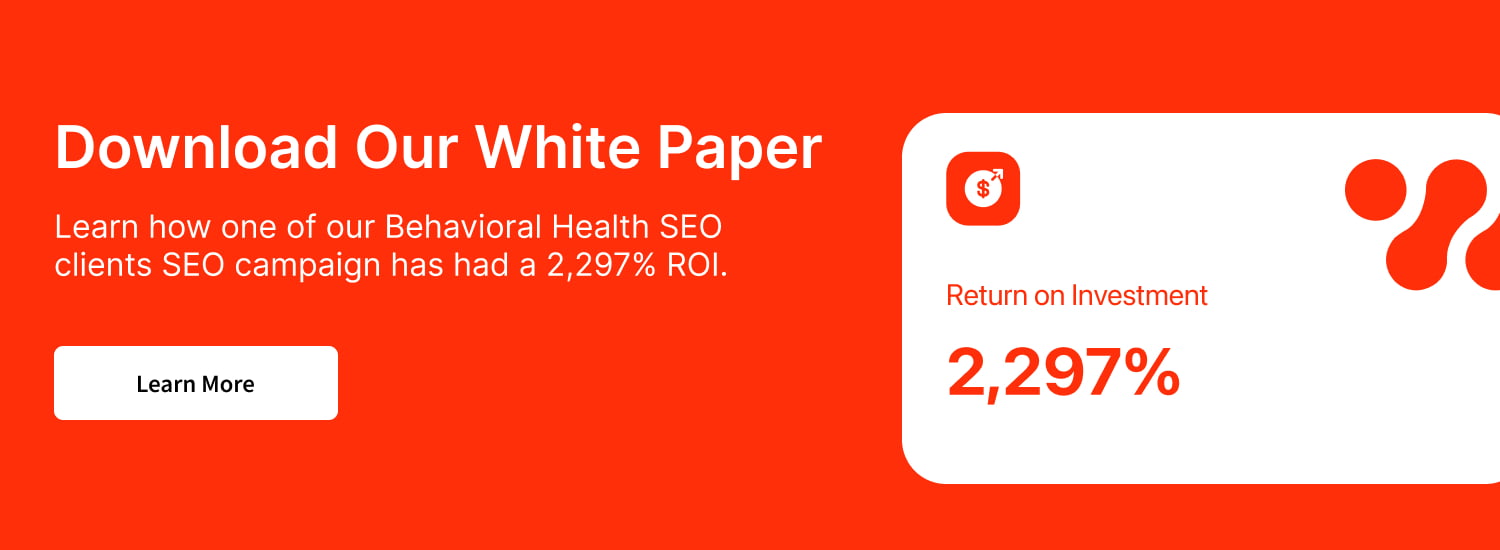
In order to effectively market an addiction treatment center you must invest in many marketing strategies and pay close attention to what is working best.
According to MarketWatch there were over 14,000 drug, alcohol and other addiction treatment facilities in the United States in August of 2014. Statista puts that number at 14,399 in 2016 with the highest number of recovery centers in California and the fewest in Delaware.

Now, the surgeon general said that 1 in 7 American adults will face substance addiction in their lifetime and on October 26, 2017 President Trump declared the opioid crisis a public health emergency.
All of this information would seem to indicate a major opportunity and fierce competition. It would seem every rehab center would want to start marketing and advertising their services everywhere possible. The trouble for addiction treatment centers is that even with a massive marketing budget, it isn’t a very easy straightforward thing.
The rehab industry faces some unique marketing challenges that other industries don’t really face.
Although addiction is a disease, there is a lot of shame and guilt surrounding addiction that prevents many people from seeking help even if they need it. Although they often downplay it to others, they are often aware they need some kind of treatment, but are reluctant to commit to the public scrutiny that comes with a treatment program.
Substance abuse treatment is a big commitment and addicts don’t want their problems shared publicly with others. Some need time off of work or time away from friends and loved ones. This can often be uncomfortable to explain.
When looking for addiction treatment for a family member or a loved one, a base level of trust must be established. Often when a mother is looking for treatment for a child she is calling multiple facilities, reading all the reviews and asking friends about similar experiences.
Family members and addicts alike want to know that you are a reputable treatment center with highly qualified staff. They need to be able to trust you with the life of one of their loved ones. Other industries do not have similar barriers.
Although it may be apparent to all those around, often the sufferer may not realize that there is a problem. People suffering with addiction typically justify their actions and avoid dealing with associated problems. Underlying addiction there are often co-occurring mental health issues.
Often addicts believe that if they weren’t so depressed, maybe they wouldn’t use. Or, “maybe if I wan’t so anxious all the time I wouldn’t have to take so many drugs.” When really, the mental problems are just intensified by the drug use. Often an intervention and an objective study the facts can quickly paint a clear picture of the problem.
Relapse is extremely common for recovering drug addicts. In fact more than half of people who go through treatment relapse in the first year. People who stay sober 1 year have a lot lower chance of relapse, but it is still very common.
Often people looking for addiction recovery have already relapsed in the past after trying to stay sober and are not confident treatment will be effective long term. For these people, drug and alcohol rehab can seem like a waste of effort.
If you think about it these are major objections! “I don’t want anyone to know,” “I don’t trust you,” “I don’t believe my problem is that serious,” and “it probably won’t work anyways.” If you cant come up with an effective addiction marketing strategy that addresses all of these concerns, it’s likely to be ineffective.

Just because marketing an addiction treatment center is extremely challenging, doesn’t mean you can’t do it successfully. The purpose of this article is to encourage you to explore several channels for acquiring patients for your facility bearing in mind the objections we will potentially have to overcome.
Having relationships with other professionals and organizations can be one of the best way to generate admissions while avoiding objections altogether. According to The Fix, hospitals routinely offer referrals in lieu of addiction treatment services.
People who are in a hospital, another addiction treatment facility, or speaking with their trusted healthcare professional aren’t worried about stigma, trust, or an unidentified problem. These people are well aware that there is a problem and are often ready and willing to do something about it. They often have little faith that they will be successful but are willing to give it a try.
The infographic below from the American College of Emergency Physicians illustrates some grave details, but also indicates why you would be stupid not to build these relationships.
Essentially professionals at hospitals know there is a major problem and that it is getting worse, but don’t know where to send referrals.
This is a major issue as most of the people being treated for opioid overdose don’t get treatment and often die within a year. This means that as an effective addiction treatment provider you have a duty to get your name out to these organizations and save lives.
Another potential referral source for your rehab is other addiction treatment centers. Maybe you can build a relationship with an outpatient rehab, because they will inevitably have some relapses that need detox or residential treatment. Often times these centers will send you a patient because your program provides a better fit for the potential client.
We have seen this strategy work wonders and often good treatment centers have business development reps all over the country.
At Webserv, a healthcare marketing agency, we start with a thorough audit of your local search presence to see what people are saying about you and how easy it would be for a prospective client to find you.
After doing hundreds of these audits myself, I have come to the conclusion that a majority of treatment centers either entirely neglect or do a terrible job of local SEO and reputation management.
An easy lead generation strategy to implement is building a Google My Business listing that is optimized for keywords you want to rank for and implementing a review generation strategy. The easiest way to generate google reviews is to ask for a review when a satisfied patient is discharging from your facility.
The next thing you want to do is build out all of your local profiles and directory listings ensuring your name address and phone number are consistent. Our marketing services immediately list addiction treatment center in 60 local directories and about 30 industry specific directories and social media profiles. This builds some links and has a major impact on local rankings.
We started local search engine optimization with a new facility in March which had no local presence and no google my business listing. Here are the results 60 days in:
During the last 28 days they received 28 phone calls and admitted 3 clients into their rehabilitation program from the Google My Business listing.
Follow this guide (one of the best local SEO guides anywhere), or check out our 8 tips for healthcare local SEO. Then ask for reviews from happy clients, use structured data and build relevant local content to get similar results.
If you would like Webserv to conduct an audit of your rehab’s current local SEO or run a local SEO campaign for you click below to get a proposal.
Often rehabs focus too heavily on paid ads. I am a big fan of paid ads, but there are major pitfalls and if you are investing too heavily in paid ads, you are depending too heavily on a very volatile market. If you want the best consistent traffic, you need to invest more heavily in SEO.
SEO is a wonderful strategy that is very effective. You can get mass amounts of traffic that would otherwise cost a fortune. SEO is a lot of work and a step by step guide is outside the scope of this post. However I will talk about some of the most important parts of an effective strategy:
Keyword research is the first part of any effective SEO campaign. Keyword research will inform your whole strategy so make sure you get it right.
When performing keyword research the first thing that you need to focus on is the searcher’s intent. Does someone searching, “what kind of drugs does Charlie Sheen do?” admit to a treatment facility? Highly unlikely.
It is however, highly likely that someone searching, “will my Cigna PPO policy cover addiction treatment?” will admit to your facility if you can be found.
There are many tools for keyword research that will tell you how many people are searching a particular term and how hard it will be to rank for. Neil Patel’s ubersuggest is my favorite free tool.
You need to find high intent keywords that you could potentially rank for and use those keywords to inform your content strategy. Do this and the rest of your strategy is much more likely to be successful.
Marketing for addiction treatment should include link building and content generation. Link building is the process of obtaining high-quality links pointing to your website offering addiction treatment from reliable sources. These links raise your website’s search engine ranking, which broadens the audience you reach. Producing entertaining, informative, and helpful information that appeals to your target audience is known as content creation.
You may position your addiction treatment center as an industry leader and draw new clients by offering useful resources like articles, videos, and infographics. Use of pertinent keywords can help your content be found by more individuals who are looking for addiction treatment services by enhancing your search engine optimization.
To discover more about the many forms of content and when to use them, as well as some facts that show why content is ever more becoming of tremendous importance, check out our in-depth article on healthcare content creation.
Also a major part of a good SEO strategy is public relations. This includes getting mentioned in the news. Typically to get mentioned in the news, you must do something news-worthy. Charitable contributions, unique recovery stories, and advocacy in the community are all potential ways to get mentioned in the news.
Our typical approach to addiction treatment Digital PR is regular press releases when appropriate, outreach to influencers and authorities in the industry and paid articles on industry sites.
Budget permitting, we often refer our clients to a few trusted PR firms.
Google ads is a great supplemental strategy and can greatly increase exposure. We say supplemental because it should be used together with SEO. In order for an addiction treatment provider in the United States to run ads they must be LegitScript certified.
Running ads in our industry is terribly expensive as many keywords cost over $100/click. It can be beneficial and almost always results in admissions, but shouldn’t be the long term strategy because the cost is so high.
Bing can be a good option which is essentially a similar setup, but it has its own pitfalls, and the platform is nowhere near as robust as google.
Facebook ads are essentially display ads. They can work very well, but only if you have a well targeted audience. One benefit to facebook ads is they can show on instagram and all over the internet through the facebook audience network.
You can run a lead generation campaign that generates high volumes of leads, but typically they will be lower intent users than off of google ads.
Bearing in mind what we have said about your potential client not trusting you already, this can be a tough objection to overcome. Also people won’t typically tell you that they don’t trust you so you just have to know that is the case.
I am a big advocate of facebook ads overall, because I have seen much lower CPA than google, it will just be a ton of work and if you don’t have the infrastructure to follow up with mass amounts of leads I would advise against it. If you have the proper admissions team I would highly recommend facebook ads.
There are literally hundreds of digital advertising platforms that you can try in order to generate leads. There are platforms for content marketing like Outbrain and Taboola which can work well to drive traffic. There are platforms like yelp and Snapchat, among so many others.
Most of these platforms have their own benefits and drawbacks but do have the potential to drive leads opportunities and revenue for your addiction treatment center.
I personally am obsessed with digital marketing and find that it is much more powerful, because we can show our ads to people that are likely to want to see what we have to offer.
However, I was recently in Utah to go to Zion National Park and I saw rehab billboards everywhere. This was quite odd to me, but I am guessing if everyone is doing it there, it must have some merit.
I have spent millions of dollars on search and social ads and they have worked well enough that we continue to spend about half a million a month on Google and Facebook.
I am still a major advocate for these avenues, however you want to be cautious with your budget and understand that there will be major fluctuations.
Paid ads don’t give discounts when you don’t get results and you have to be prepared for them to work extremely well one month and completely fail another.
I would love to speak with you about your current strategy and look for ways to improve it. Give us a call or get a proposal complete with an in depth audit with valuable industry insights.
We recommend that you have a strong understanding of the Pros and Cons of Advertising for Addiction Treatment Centers.
Even with all the issues with stigma, trust, denial, and relapse, it is totally doable to have an effective marketing strategy for your program. If you incorporate a good mix of the strategies listed above and you execute them well it will be hard to fail.
We can provide a full behavioral health marketing strategy that will cover all the digital aspects, and provide consulting and referrals for everything else.
Wether you are looking for relationships from hospitals, other centers, looking to go in-network, trying to get some accreditation, need better revenue cycle management, or anything else pertaining to making your center more profitable, we can help.
Webserv is the leader in drug rehab marketing and would love to take some of the weight off of your shoulders. We have a great list of happy clients and will be happy to share previous and current results with you.
Everything we do is specifically to drive leads, opportunities, and revenue for your business. In order to do so we address your potential client’s concerns by using them to inform your marketing strategy. Schedule a Call with us!
With healthcare marketing, diligence is key. Businesses should do their homework when selecting an agency – scrutinizing the firm’s industry experience and specialized expertise, assessing the scope of services offered as well as its client portfolio and case studies for impactful results, gauging responsiveness to communication inquiries in punctual fashion, then allocating a budget accordingly. When these elements are weighed with discernment it allows companies to make informed decisions that can help accomplish specific goals while meeting expectations along the way. As a first step, check out our list of the 35 Best Healthcare Marketing Agencies.
[Updated June 26th, 2023]
Addiction marketing is challenging because it involves targeting individuals who are often grappling with complex issues such as substance abuse, gambling, or other addictive behaviors. These individuals may be resistant to change or may face societal stigma, making it difficult to connect with them and effectively promote help or treatment options.
The primary obstacles in addiction marketing stem from the sensitive nature of the topic and the numerous barriers that come with it. Stigma surrounding addiction can create a reluctance to engage with marketing messages, while regulatory constraints may limit advertising options, especially for substances or treatments subject to legal restrictions. Additionally, addiction marketing requires striking a delicate balance between empathetic messaging and the need to drive action, further complicating the process.
Addiction is a complex issue influenced by various factors, including psychological, social, and physiological aspects. Therefore, marketing efforts must be informed by a deep understanding of these complexities to resonate with the target audience effectively. This involves developing tailored messaging that acknowledges the unique challenges faced by individuals struggling with addiction and offering relevant solutions or support.
Ethical considerations are paramount in addiction marketing to ensure the well-being of the target audience and maintain the integrity of the marketing efforts. Addiction is a vulnerable and sensitive topic, and marketers must avoid exploiting individuals in need, instead focusing on providing genuine help and support. By adhering to ethical guidelines, addiction marketers can build trust and credibility, fostering long-term relationships with their audience.
Legal restrictions impact addiction marketing in several ways. Advertising regulations often dictate how substances or treatments related to addiction can be promoted, particularly when it comes to substances with potential for abuse. These restrictions vary from country to country and even within regions, requiring marketers to stay up-to-date with the latest guidelines to ensure compliance. Navigating within the boundaries set by these legal restrictions demands creativity and innovative strategies to reach the target audience effectively.